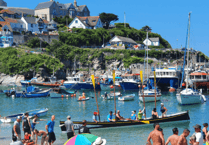A parliamentary debate about train services in the South West has heard that Cornwall is “notoriously underserved by transport” and that an array of rail and road improvements need to be made to ensure the Duchy thrives in the future. The new Mid Cornwall Metro, linking Newquay and Falmouth, was also described as “not the transformational project that the Duchy needs”.
The discussion in the House of Commons on Tuesday, January 14, in front of the Transport Minister was instigated by Martin Wrigley, MP for Newton Abbot. He said the creation of the HS2 link to Old Oak Common, Britain’s new super-hub station in London, will not have any noticeable gains for the South West.
Andrew George, Liberal Democrat MP for St Ives, responded that “it seems that with this multi-billion pound HS2 project, people in Penzance, in west Cornwall, will experience all the pain but none of the gain”.
Mr Wrigley, who highlighted work to improve the line at Dawlish in Devon, told fellow MPs that “Devon and Cornwall are notoriously underserved by transport: there is one motorway and just two national roads”. He added that the Dawlish work will be interrupted by the creation of the HS2 link to Old Oak Common.
“Penzance, west Cornwall and the Isles of Scilly are all in my constituency,” said Mr George, “so I know that if there are problems on the link at Dawlish, that can multiply the impact of those disruptions for people in the far west of Cornwall. If it is two hours to Exeter [from Paddington], it is another three hours down to Penzance. It needs to be considered that we want to avoid the unnecessary disruption to people’s lives for the next seven years.”
The MP for Newton Abbot replied: “I consider myself fortunate, going to Devon. If I were to continue the journey in Cornwall, the train speed would slow down considerably. Journey times could be significantly reduced by even partial electrification, as hybrid trains on the line could speed up faster and climb some of the hills quicker. I am sure my Cornish colleagues could elaborate.”
Noah Law, the Labour MP for St Austell and Newquay, then entered the debate, highlighting a number of transport concerns in Cornwall. He said the new Mid Cornwall Metro project, linking Newquay to Falmouth, was “not the transformational project that the Duchy needs”.
He told MPs from all parties: “The need to improve rail services across the South West – particularly in Cornwall, which is at the sharp end of our problems – cannot be overstated. Connectivity is the backbone of our economy and our communities, yet our transport infrastructure still lags far behind what is needed to unleash their full potential.
“This summer, the Mid Cornwall Metro will launch in my constituency, offering improved rail links between Newquay and other parts of Cornwall. Although that is a very welcome development that goes some way to undoing the damage inflicted on the line in 1987 by the then Prime Minister, for people outside of Newquay, the Mid Cornwall Metro, despite its lofty name, will fall somewhat short of being the transformational project that the Duchy needs.
“That brings me to the wider issue of transport in my constituency. The road between our two major towns, St Austell and Newquay, is winding and unsafe. Given the absence of a direct train linking the towns – despite a track that runs relatively directly from St Austell, through Burngullow and up to St Dennis, falling short of rejoining the main Newquay line at Goss Moor by just a mile or so – large-scale capital investment in a transformative project is desperately needed.”
Mr Law added: “We have a stunning stretch of line running from my hometown down into another town served by treacherous roads: Fowey, a town that has long shipped our white gold, china clay, to the world.” He urged the Government to explore the feasibility of “such transformative projects in Cornwall – particularly on those magnificent branch lines, which have been ravaged over the years – to provide clarity on our clean transport plans and to make public transport in Cornwall a no-brainer rather than a chore, ensuring that our communities have the infrastructure that they need to thrive.
“If we are to build more homes, people in Cornwall must see that commensurate services and infrastructure are put in place.”
He went on to say a “fair deal” was needed for the Isles of Scilly as well as improved rail links to Falmouth, which is a contender for a floating offshore wind hub. “In the east, we also face significant challenges with the Tamar bridge and Torpoint ferry services, which are vital lifelines for local residents. We need a deal that prioritises their needs and alleviates the financial burden on commuters and families.”
Mr Law also called for dramatically improved internet connectivity on trains, adding that passengers across the South West are too often excluded from the benefits of high-speed, dependable internet access. “It would be a small grace to mitigate some of the chaos caused by the Old Oak Common HS2 project – a supposed England and Wales project, and even an England and Cornwall project, but I will believe it when I see it,” he said.
“The South West, including Cornwall, deserves a transport strategy that addresses our real needs and delivers transformative change. I look forward to hearing how the Minister intends to prioritise our region, close the gap in infrastructure investment, and provide Cornwall and the wider South West with the tools we need to thrive in the years ahead.”




